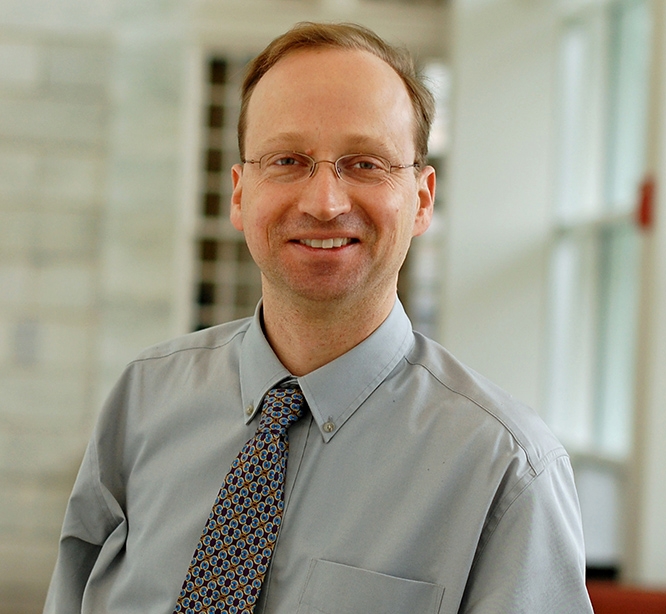College Presents Perkins Award for Teaching to Mathematician John Schmitt

MIDDLEBURY, Vt. – Middlebury College has awarded the 2016 Perkins Award for Excellence in Teaching to John Schmitt, an associate professor of mathematics who prefers to think of the award as a departmental, rather than an individual, honor.
“I see the Perkins as a celebration of the entire mathematics department, and not as a celebration of a particular individual. To me it recognizes our department as a collection of people who are committed to working together to educate our students,” said Schmitt, 43, who received his first Perkins Award in 2008 when he was a visiting assistant professor.
Schmitt finds it ironic that many people outside his field don’t think of mathematics as a social endeavor.
“Our department encourages social interaction and creativity because it makes mathematics more fun. Yes, mathematics can be done by an individual sitting in isolation with a pad and pencil, but there’s also the reality that boisterous interactions in a room can produce results and be a more enjoyable way to do mathematics.”
The physical layout of the mathematics department in Warner Hall – an open conference and study space surrounded by a bevy of faculty offices – often leads to chance interactions between faculty and students. It is also conducive to creativity, he said.
Schmitt teaches Middlebury undergraduates in his specialties – mathematical combinatorics (the art of counting) and graph theory – as well as courses in calculus, statistics, and linear algebra. He also designed and teaches a winter term course in Combinatorial Games and Puzzles as well as a first-year seminar on the writings of Martin Gardner, who authored the “Mathematical Games” column in Scientific American for 25 years.
“Whenever I can,” Schmitt explained, “I like to work with students about open problems because it conveys to them the notion that mathematics is alive and breathing and there’s still lots of work to be done. I don’t have all the answers, but I have something better: a set of open problems that are challenging, interesting, and fun.”
Schmitt was recently featured in Middlebury Magazine for his work with a student on an open problem in combinatorics: What is the minimum number of clues that can be given while still providing for a valid Sudoku puzzle?
He was nominated for the Perkins Award by a group of mathematics students, one of whom, Gabriel Doble ’17, said, “Professor Schmitt is an exceptional educator in many ways, but he stands out most prominently in the dynamic structure of his lectures.
“He not only recognizes the direction and flow of the mathematics he is teaching, but also the direction and flow of his students’ understanding. Each lecture carefully intertwines these two trajectories, ensuring that one does not jump ahead of the other, thus keeping students engaged and culminating in a thorough understanding of the mathematics.”
Schmitt joined the Middlebury faculty as a visiting assistant professor in 2005. From 2008 to 2012 he was an assistant professor, and in 2012 he was promoted to associate professor. Schmitt holds a B.A. in mathematics from Providence College, an M.S. in mathematics from University of Vermont, and a Ph.D. in mathematics from Emory University. His research has been funded by the National Science Foundation, National Security Agency, and other sources.
The Middlebury community will honor him at an award ceremony and reception on May 5 at 4:30 pm in Room 219 of McCardell Bicentennial Hall.
The Perkins Award is provided by the Professor Llewellyn R. Perkins and Dr. Ruth M.H. Perkins Memorial Research Fund, and it was made possible by a gift from Ruth Perkins, Middlebury Class of 1932, in memory of her husband, Llewellyn, who taught at Middlebury from 1914 through 1941. Professor Perkins founded and chaired the mathematics department.
Their children, Marion Perkins Harris ’57, a science teacher, and David Perkins, a physician, augmented the fund and expanded the scope of the award to honor their mother, Ruth, as well as their father. The award supports the recipient’s faculty development. It is presented in even-numbered years to a member of the mathematics or computer science department, and in odd-numbered years to a faculty member who teaches in the natural sciences.
– With reporting and photography by Robert Keren

